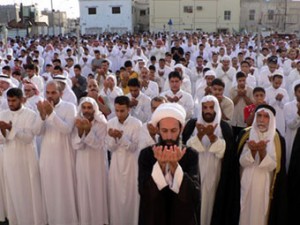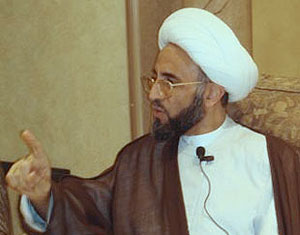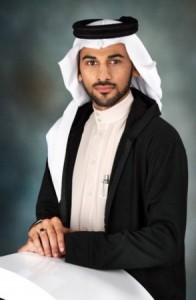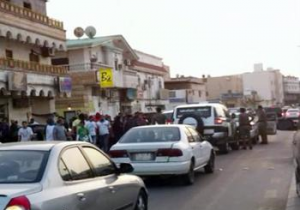
When Saudi Shi’ites mark the birthday of the Prophet Mohammad, meeting at mosques and exchanging sweets is only part of what’s going on.
The Shi’ites also are testing the tolerance of Sunni clerics and taking advantage of reforms introduced by King Abdullah that allow them greater freedom to practise their branch of Islamic faith.
For the hundreds of Shi’ites who gathered on Sunday in the rundown eastern town of Awwamiya, near the Gulf coast, this year is special.
Just an hour’s drive and a bridge away is the island nation of Bahrain, usually a place where Saudis go for a bit of weekend fun but now the scene of a majority Shi’ite uprising that is challenging the minority Sunnis’ grip on power.
“You need to demand reforms and start popular movements if you want to achieve something. If you don’t do anything the government will not act,” said Mohammed, a young man who, like others, gave only his first name.
“You need to make use of the fact that the regime is in a weak position,” he said, referring to anti-government protests sweeping across the Arab world after popular uprisings toppled the rulers of Tunisia and Egypt.
Mohammed used the Arabic word ‘nizam’ for ‘regime’ — the same word shouted by thousands of Egyptian protesters in Cairo’s Tahrir Square to demand change.
Normally fear of landing in jail would curb such talk, but television images of protests and rapid Internet communication are making people think about what might be possible.
Analysts do not expect Egyptian or Tunisian-style unrest in Saudi Arabia, where the government sits on more than $400 billion in petrodollars that can be used to alleviate social pressures such as high youth unemployment.
But they say the elderly King Abdullah will face pressure from Shi’ites watching protests in Bahrain to give them a greater say and start some political reforms, such as calling municipal elections.
So far, Shi’ites are not represented in the cabinet, and often complain of attacks by hardline Sunni clerics who see them as heretics or even agents of Iran, Saudi Arabia’s main rival.
“We follow events in Bahrain closely due to the geographical proximity, the shared religion and because we also have demands for reform,” said Khoder Awwami, a young Shi’ite preacher.
Saudi Arabia was stung by the loss of a key ally in Egyptian President Hosni Mubarak and events in Bahrain, where it backs the ruling Sunni al-Khalifa family.
Moderate Shi’ite leaders say King Abdullah may announce higher benefits — also expected by analysts — after returning from medical treatment. But that may not be enough to appease young people demanding a voice in the conservative kingdom.
“Will economic reforms have a long-term effect to satisfy people? I think some also want real reforms,” said Tawfiq al-Saif, a leading Shi’ite intellectual in the kingdom.
Offering some hope was the release on Sunday of three Shi’ites held in jail for more than a year, days after residents say activists staged a small but rare protest calling for them to be freed.
“I think the regime saw the necessity to defuse the situation,” said a young man who gave his name as Hussain.
In a small mosque illuminated by green and yellow lights to mark the Prophet’s birthday, dozens lined up to meet the three former prisoners.
“I was in prison over a year. I’m so happy to be here,” said released blogger Muneer al-Jasas, smiling widely and shaking hands.
NIMR’S CALL
Abdullah has given Shi’ites more freedom since 2005 but the outlook for his reforms is uncertain as he is around 87 years old. The slightly younger Crown Prince Sultan spent much of the past two years out of the kingdom for sickness.
With both in their 80s, succession is looming.
Interior Minister Prince Nayef, who is close to the Wahhabi clerics who uphold the kingdom’s austere brand of Sunni Islam, would have the best chance to become king after being promoted in 2009 to second deputy prime minister, analysts say.
Tensions flared in the Eastern Province in 2009 after Shi’ite preacher Nimr al-Nimr from Awwamiya suggested in a sermon that Shi’ites could one day seek their own state — a call heard only rarely since the 1979 Iranian revolution, which triggered some unrest among Saudi Shi’ites.
Since then calm has returned after moderate Shi’ite leaders distanced themselves from Nimr’s call.
There are no official figures about the Shi’ite minority.
“The government says Shi’ites make up 5 percent of the total population but I looked at the latest census data village by village and think it’s rather eight to 12 percent,” said Ibrahim al-Mugaiteb, head of the independent First Human Rights Society.
While Shi’ites can practise their faith in Awwamiya and nearby towns, they would get in trouble if they tried to do so in the neighbouring communities of Dammam or Khobar, he said.
Dammam, a port city with a large Shi’ite population, has just one mosque serving them. Authorities do not permit new ones, the U.S. State Department said in its annual International Religious Freedom report in November.
Anti-government graffiti on walls in Awwamiya reflect simmering anger. Residents say workers repainted a wall but Shi’ite slogans quickly returned.
CRUMBLING PAINT
Shi’ite leaders who went into exile after the 1979 protests returned in the 1990s under a deal with the government. Moderate leaders say things are better than a decade ago, but they fear losing control of a younger population frustrated with a lack of reforms.
Jafar al-Shayab, a member of the municipal council in the nearby Shi’ite town of Qatif, said authorities needed to offer the Internet-savvy young people a voice or risk losing them.
“My daughter didn’t find a job for a year after university graduation in IT,” said Shayeb, adding that she had joined a Facebook group where other unemployed gather.
Despite being home to most of Saudi Arabia’s oil wealth, the Eastern Province is visibly less affluent than the Saudi capital of Riyadh, with paint crumbling from old houses and roads full of potholes.
In a sign that the government wants to reach out more to Shi’ites, regional governor Prince Mohammed bin Fahd, an ally of Prince Nayef, made a rare visit to Qatif last week.
Iran’s rising influence since the 2003 U.S. invasion of Iraq produced a Shi’ite government in Baghdad and also revived official fears that Shi’ites could become a fifth column against the Saudi state, analysts say.
Leaked U.S. diplomatic cables quoted King Abdullah as urging Washington to attack Iran to destroy its nuclear programme, and analysts say Nayef also appears to be a hawk on Iran.
Simon Henderson, a Washington-based analyst on Saudi affairs, said Riyadh faced the dilemma of hoping that protests in Bahrain would end peacefully while fearing a greater role in government by majority Shi’ites.
The U.S. naval base in Manama is vital for Riyadh, providing U.S. military protection of Saudi oil installations and the Gulf waterways on which its oil exports depend, without any Western troops present on the soil of the kingdom, Islam’s birthplace.
“It is hard to see what meaningful reform is in Bahrain unless it is a Shi’ite-controlled government. The Saudis won’t want this,” Henderson said.
By Ulf Laessing
























